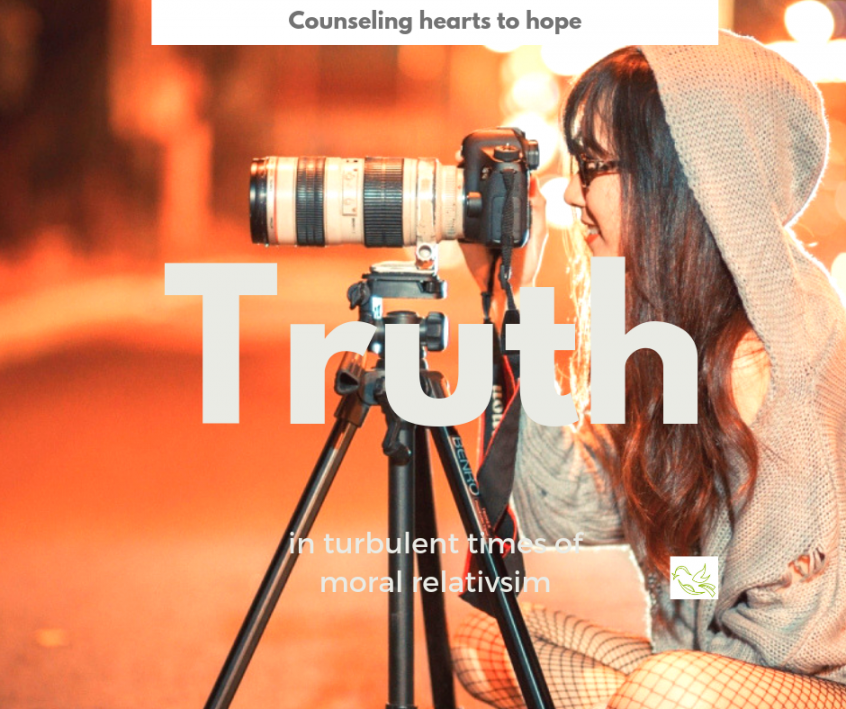Moral relativism — it defines topsy-turvy postmodern culture and is coming to a counseling room near you. How might a counselor think compassionately about such things? This article by BCC Counselor Lucy Ann Moll, DMin candidate, ACBC, appeared first here at The Biblical Counseling Coalition.

Remember the blind men and the elephant? Six blind sojourners come across different parts of an elephant in their life journeys and each, in turn, creates his own version of reality based on his experience. One proclaims the elephant is a wall, another says it’s a snake, another a spear, and so forth.
This illustration is the poster child of moral relativism, which insists that “what’s right for me is my truth.” It asserts that personal truth is the highest form of truth. Moral relativism dominates our culture and has likely barged into your counseling office, as it has mine, noisily demanding that one must “live their truth.”
Moral Relativism Is Old News
It reaches back to the Garden. The smooth-talking serpent questioned the Truth-giver’s truth—that Adam and Eve may eat from all the trees but one, or “you shall surely die” (Gen. 2:17)—and the first couple gobbled Satan’s lie.
Adam’s new not-true “truth” sent him running and hiding and blaming. “I heard the sound of you in the garden, and I was afraid, because I was naked, and I hid myself” (Gen. 3:10). He hid because of the shame of his sin of disobedience. Then he compounded his lie in blaming the woman, who in turn blamed the serpent.
God hates lying. Proverbs 12:22 declares:
“Lying lips are an abomination to the LORD, but those who act faithfully are his delight.”
Its opposite is truth, of course. God determines the truth. Not me, not you, and not our counselees.
Moral Relativism in Modernity
Back in the ‘70s, I believed the lie of moral relativism packaged as a pro-choice argument. I admit this with great embarrassment. My friend Ellen was “with child,” thanks to her college boyfriend, a condom failure, and her belief that sex before marriage was “just fine, thank you.”
The good Catholic girl that I was, I thought abortion was wrong, and “I’d never get one,” but “if it’s right for you, then that’s your choice,” and thus I supported her decision. A mutual friend and I checked out the abortion clinic with the Better Business Bureau before she went because we cared about her.
And the baby? What baby?We all tried to forget. Moral relativism had won.
Now let’s zip to today and survey the cultural landscape: drag kids, transgenderism, an alphabet soup of gender “expressions” (whatever that means), pedophilia disguised as man-boy love, and of course abortion on demand through all the months of pregnancy. And when abortion “fails,” infanticide.
Moral Relativism in the Counseling Office
A little while back, the parents of a teen girl named “Kaylee” wanted me to talk with her about her older brother’s decision to transition to be “a female.” He had begun hormone therapy and was considering radical surgery to remove his genitalia. There was also talk of breast implants.
Equally confusing, my counselee’s brother was dating a bisexual. A man transitioning to a woman was dating a guy who admitted to liking men and women. Weird, right? Yet my counselee took it in stride. “She’s happier now,” Kaylee remarked, using the appropriate progressive pronoun. “She’s who she wants to be, who she’s meant to be.”
The parents professed Christianity as did Kaylee. The mom wasn’t outwardly upset over their son, but the dad seemed embarrassed and said so. Their concern now was making sure Kaylee was fine with their family’s new not-true truth while also admitting they walked a road where up is down and right is wrong.
Not surprisingly, when Kaylee and I read Scripture verses and discussed their meaning, she—like many counselees—was quick to say, “What this means to me is ….” That little prepositional phrase “to me” is a sign of our moral relativistic times and a bane to Bible study.
An Important Place to Reclaim Truth
As we open our Bibles and read Scripture, there may be no better place to reclaim truth in the counseling office than proper Bible study. Today’s prevailing cultural message to “live your truth” is demanding and noisy and a lie. It lures people, including Christians, to live whatever way feels right to them (Prov. 14:12).
But historical-grammatical Bible study provides a process to understand a text as God intended, protecting us from falling into error. Many excellent volumes have been written on how to study the Bible. I encourage you to ask your pastor or a spiritually mature Christian friend for recommendations. One of the many excellent resources is John MacArthur’s How to Study the Bible (Chicago: Moody, 2009).
Along these lines, let us start with three primary questions we can encourage our counselees to ask as they read a passage of Scripture:
- What does it say? (Not what does it say to me.)
- What does it mean? (Not what does it mean to me.)
- How should it change me? Here, the “me” is spot on and we might follow it up with these additional questions:
- What does this passage teach me about God?
- How does this aspect of God’s character change my view of self?
- What should I do in response?
Moral relativism is our culture’s precious grandchild now. It gets a pat on the head and sugar for supper. It demands its way like 2-year-old. And it barges into the counseling room. So how might you quiet it? Feed your counselee Truth.
Questions for Reflection
Which Bible study process helps your counselees have a correct understanding, interpretation, and application of Scripture?
Describe a time when you saw moral relativism play out in the counseling office, classroom, or church lobby. What was your response?
How are you guarding yourself and your family in today’s moral relativistic times?







